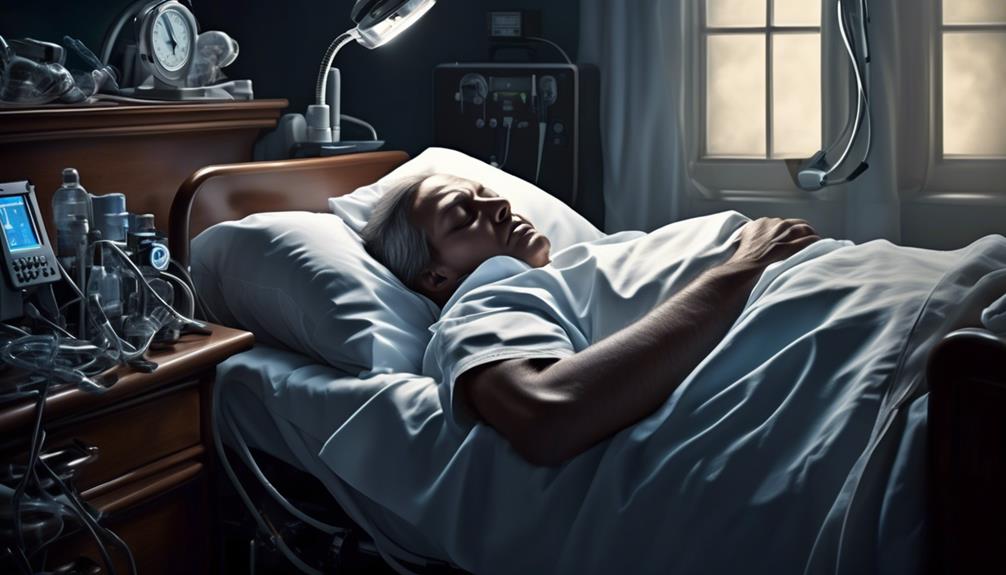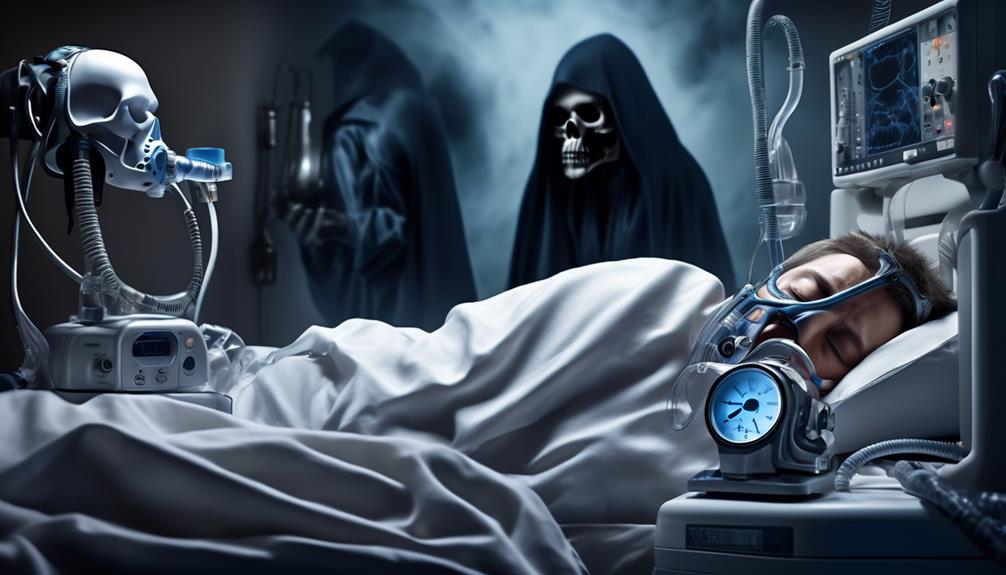Let’s talk about the risk of death from sleep apnea.
Many are unaware of the potential severity of this condition.
The consequences might surprise you.
Key Takeaways
- Untreated sleep apnea increases mortality risk significantly.
- Weight management crucial for preventing and treating sleep apnea.
- Timely diagnosis and intervention vital in mitigating fatal outcomes.
- CPAP therapy reduces cardiovascular mortality risk in sleep apnea.
Risks of Untreated Sleep Apnea
Untreated sleep apnea poses a grave risk to one's health, potentially leading to a host of severe conditions. Among these risks are high blood pressure, heart disease, type 2 diabetes, liver problems, and stroke.
The implications of untreated sleep apnea extend beyond these individual health concerns; it's associated with an increased risk of cardiovascular issues, strokes, heart attacks, and even a reduced lifespan if not addressed promptly. Post-menopausal women face particular challenges with sleep apnea due to changes in weight distribution, making them more susceptible to its complications.
Weight loss emerges as a critical aspect in both treating and preventing sleep apnea, underscoring the importance of managing obesity as part of a holistic approach to this condition.
Additionally, untreated sleep apnea can independently raise blood sugar levels, contributing to a range of health risks. This emphasizes the vital role of timely diagnosis and intervention in mitigating the potential dangers associated with this sleep disorder.
Complications and Mortality

Complications and mortality associated with obstructive sleep apnea (OSA) present significant health risks that demand prompt diagnosis and appropriate intervention to mitigate potential fatal outcomes. Individuals with untreated obstructive sleep apnea face an increased risk of all-cause mortality, with those suffering from severe OSA having a mortality risk 3.2 to 4.3 times higher compared to those without OSA. Cardiovascular diseases, strokes, and sudden cardiac death are potential fatal consequences of untreated OSA due to breathing disruptions during sleep. Studies have shown that continuous positive airway pressure (CPAP) therapy for OSA may reduce the risk of cardiovascular mortality. Prompt diagnosis and treatment of sleep apnea are crucial in reducing the mortality risk associated with the condition. Below is a table summarizing the key risks and mortality factors related to untreated obstructive sleep apnea:
| Risk Factor | Impact on Mortality |
|---|---|
| Severe OSA | 3.2 to 4.3 times higher mortality risk |
| Cardiovascular Disease | Increased risk of mortality |
| Sudden Cardiac Death | Potential fatal consequence |
| Breathing Disruptions | Linked to all-cause mortality |
Impact on Health and Well-being
The impact of obstructive sleep apnea on health and well-being extends beyond the immediate complications, encompassing a range of systemic consequences that can significantly affect overall quality of life. Individuals with untreated sleep apnea face an increased mortality risk, particularly those with severe apnea and low oxygen levels.
The cardiovascular system is especially vulnerable, with sleep apnea linked to cardiovascular disease and a higher likelihood of cardiovascular mortality. Breathing disruptions during sleep not only impact restfulness but can also lead to changes in blood vessels, abnormal heart rhythms, and an elevated risk of sudden death.
Moreover, untreated sleep apnea exacerbates conditions like high blood pressure, diabetes, insulin resistance, pulmonary hypertension, stroke, and abnormal heart rhythms. Seeking timely diagnosis and treatment is crucial to prevent severe complications and reduce the risk of mortality, emphasizing the importance of addressing sleep apnea to safeguard overall health and well-being.
Understanding Sleep Apnea Dangers

Understanding the dangers of sleep apnea requires a comprehensive examination of its impact on overall health and mortality risks. Untreated sleep apnea poses significant threats, including an increased risk of high blood pressure, cardiovascular diseases, and strokes. Studies have shown that individuals with severe sleep apnea face higher mortality rates, particularly when accompanied by low oxygen levels. Those with undiagnosed sleep apnea also experience poorer survival rates compared to individuals undergoing treatment such as CPAP therapy. This therapy has been linked to a reduction in cardiovascular mortality associated with sleep apnea. To understand the gravity of sleep apnea dangers, it is crucial to recognize the potential risks it poses to one's overall well-being and longevity.
| Sleep Apnea Dangers | Impact |
|---|---|
| High blood pressure | Serious risk factor for cardiovascular issues |
| Severe sleep apnea | Linked to increased mortality rates |
| Untreated sleep apnea | Associated with poorer survival rates |
| Cardiovascular diseases and strokes | Common outcomes of severe sleep apnea |
Recognizing Potential Fatal Consequences
Recognizing the potential fatal consequences of untreated obstructive sleep apnea involves understanding the increased risk of sudden death, particularly in older individuals and those with severe OSA. In some rare cases, individuals may die from the inability to restore normal breathing during an apneic episode, highlighting the severe consequences of untreated OSA. The disruption of cardiovascular and nervous systems by OSA can lead to sudden cardiac death, emphasizing the importance of timely diagnosis and appropriate management.
Shared risk factors between sleep apnea and sudden cardiac death underscore the necessity of recognizing signs and symptoms early to prevent fatal outcomes. By being vigilant and proactive in identifying potential indicators of OSA, such as excessive daytime sleepiness, loud snoring, and gasping during sleep, individuals can seek timely intervention to mitigate the risks associated with untreated sleep apnea. Understanding the link between untreated OSA and fatal consequences is crucial in promoting overall health and well-being, especially in individuals at higher risk for severe complications.
Frequently Asked Questions
How Long Can You Survive With Sleep Apnea?
Without the context of mortality risks, individuals with untreated severe sleep apnea can struggle with daily functioning due to excessive daytime sleepiness, cognitive impairment, and mood disturbances.
Untreated sleep apnea impacts quality of life and can lead to various health issues. It's crucial to seek professional help for proper diagnosis and treatment to improve overall well-being and reduce associated health risks.
Early intervention can significantly enhance one's quality of life.
What Happens if You Leave Sleep Apnea Untreated?
If left untreated, sleep apnea can lead to serious health complications. Our bodies need quality sleep for proper function, and untreated sleep apnea disrupts this process.
This can result in daytime fatigue, increased risk of heart disease, high blood pressure, and even stroke. Seeking timely diagnosis and treatment is crucial to mitigate these risks and improve overall well-being.
Prioritizing good sleep habits is key to preventing potential long-term consequences associated with untreated sleep apnea.
How Rare Is Death From Sleep Apnea?
Death from sleep apnea is relatively rare, with increased risk linked to factors like age, severity of apnea, and other health conditions. Severe apnea raises the risk of sudden death. In rare cases, individuals may succumb due to the inability to restore breathing during an episode.
Untreated sleep apnea can lead to sudden cardiac death, particularly in older individuals with severe apnea and low oxygen levels. Early recognition and treatment are vital to mitigate this risk.
Can You Suffocate From Sleep Apnea?
We must highlight the potential dangers of suffocation from sleep apnea.
During sleep apnea episodes, airway blockages can lead to pauses in breathing, causing the risk of suffocation. This occurs when the brain triggers awakenings to resume breathing, disrupting sleep patterns.
Proper diagnosis and treatment are crucial to prevent these suffocation episodes.
It's essential to address this issue promptly to ensure the safety and well-being of individuals with sleep apnea.
Conclusion
In conclusion, untreated sleep apnea is like a silent killer lurking in the night, ready to strike when least expected. The risks of complications and mortality associated with this condition can't be ignored.
It's crucial to recognize the potential fatal consequences of sleep apnea and take proactive steps to seek diagnosis and treatment. By addressing this serious health issue, we can safeguard our well-being and potentially prevent tragic outcomes.









